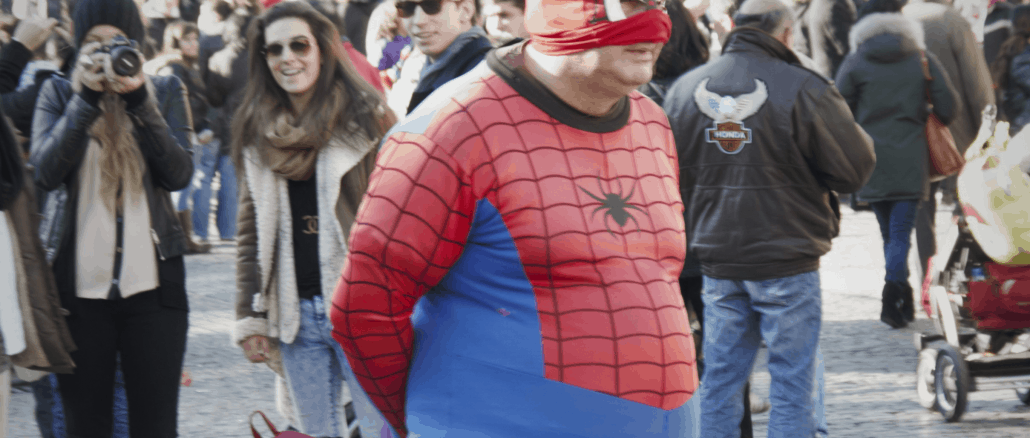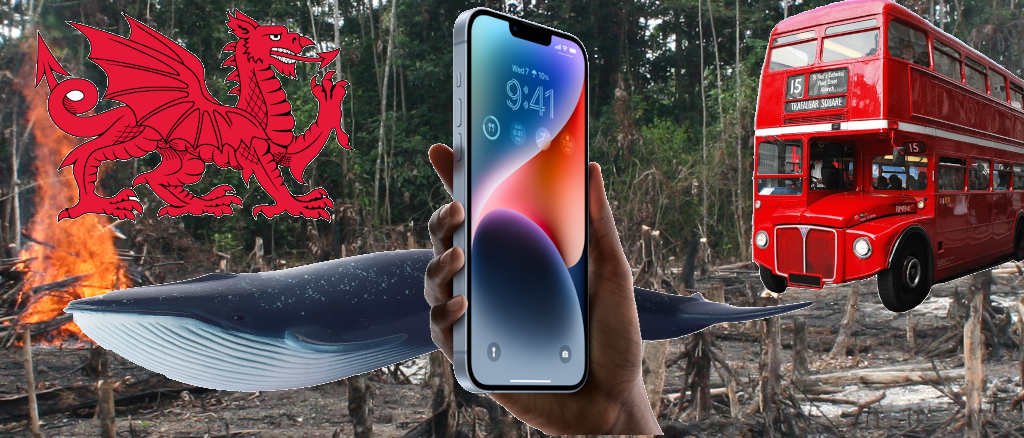Drones, stings, and whistleblowers – Where are the cyberpunk superheroes?

I’ve just watched Into The Spider-Verse for the first time. It was for The Teen’s birthday - what with the danger of virus transmission in enclosed public places, we decided to stay in The Crow’s nest and watch a film on our 55 inch screen rather than venture out to the cinema along with other potential plague vectors.
It was pretty awesome - the animation style was captivating; the story was good; the kids loved it. All three of the juvenile viewers wanted to be one of the Spidermen - to have superhero powers to fight crime, injustice, supervillains, and petty street thugs. To leave them dangling for law enforcement to find and deal with appropriately.
On previous occasions, they have wanted to be Batman, Iron Man or any of the other technologically charged vigilantes fighting evil on the mean streets of northern England.
Naturally, this is unrealistic. The youngest is eight years old, and eight year olds are known to fare poorly in battles against adult thugs, thieves, and murderers.
But vigilante justice doesn’t need to depend on physical strength, superpowers, or anything else beyond the basic ability to spend cash.
The role of the superhero
Personally I’ve not been a fan of the superhero genre since Michael Keaton last played Batman, however the presence of fledglings in the nest means that I have been exposed to the entirety of both the Marvel and DC universes.
Let’s ignore the big bad uglies here.There is not going to be an alien invasion of Birmingham, and anyone who tries to blow up a hospital in Hull is going to be relentlessly hunted along with their co-conspirators, and sentenced to an extraordinarily long time in jail.
Dealing with these big ticket emergencies is the job of the state and by-and-large, they do a pretty good job of it - both in preventing such situations from arising, dealing with them when they do, and amassing evidence for a prosecution.
Where they do less well is dealing with smaller crimes - even in comic book universes, most superheroes spend much of their time occupied with petty bullshit crimes instead of fighting their nemesis. Old time Spidey swung across the city to save old ladies from being mugged in alleys - tying up villains and leaving them for the police to find - along with an eyewitness to the crimes, and the villains’ fingerprints all over the stolen purse, bag of swag or whatever.
Leaving aside the actual fighting and tying up - both of which potentially see Peter Parker open to charges of assault, kidnapping, and false imprisonment - most of what he does is ensure that there is a witness, and there is evidence. These are the things the police and the Crown Prosecution Service (or US equivalent) need to pursue a case.
Welcome to Britain in the 21st Century
In the last 20 years, the occupants of the Crow’s Nest have had five motorcycles stolen, and one car. In every single one of those cases, we were told by police officers that without video evidence there was no chance of finding the perpetrators. And we would need to find that video evidence ourselves - they simply didn’t have the time of the resources.
Yes, the UK has a truly insane number of CCTV cameras, but no-one is actively watching them, and as we discovered, most are of too low quality to be of any kind of use. They’re pointing in the wrong direction. They’re grainy.
Car thefts go unsolved. Burglaries where a suspect isn’t immediately apparent go unsolved. Most assaults never see a suspect brought to caught. These are the areas in which a superhero could take up the slack left by an overstretched and underfunded police force.
Unfortunately (or fortunately) superheroes aren’t really a thing.
Anyone can be a superhero - so why aren't they.
We’re in the third decade of the 21st century here, folks. And there’s more to crime-fighting than superpowers, a fancy suit and an optional cape. We live in a high tech age, and low-lifes are everywhere. Here are some of the tools at your disposal:
Drones
What do Batman, Spiderman, and Superman all have in common? Don’t answer - it’s too easy. They all like to perch silently on top of tall buildings, watching the grim streets of the city below them, before swooping, swinging, or jumping down to interfere in the nefarious deeds of ne’er do wells.
You know what else is really good at perching silently on top of tall buildings, watching the grim streets of the city below? Drones. And they can convey live video streams the entire time.Some can even be equipped with weapons or nets so that they can join the fight. A drone is the ideal superhero by proxy.
I can think of several pubs within two miles of the Crows’s Nest where a drone casually observing the beer garden ad car park could watch individuals casually necking six pints of Strongbow, before stumbling into their vehicle and swerving home. Normally these drivers are only apprehended when they’ve slammed into a wall, or worse - a person. Is pursuing drunk drivers a worthwhile use of a cyber-vigilante’s time?
Likewise, there are spots around town where drug deals are known to take place, and a Crow’s eye-view of activity would be superbly interesting to the folks at CID. Car and bike thieves could be monitored, identified and relentless tracked back to their homes - to receive a visit from Her Majesty’s Constabulary as and when they get around to it - which is probably in a few months if they’re not too busy.
We’re envisaging hordes of cyberpunk drone vigilantes - headsets on in a darkened room, with a cigarette hanging from the corner of their mouths - each with their own areas of expertise and enthusiasms. Some pursuing car thieves, others racing down alleys in pursuit of bag snatchers. There could be drones buzzing public parks and pavements, watching for those who fail to pick up their dog’s leavings or drop cigarette butts.
It’s not like drone ownership is particularly expensive. Sure, the initial outlay can be thousands, depending on your requirements, but we’ve just walked past a DJI Phantom 2 in a secondhand shop for £120. Lidl regularly sells camera equipped drones for £40.
Infiltration and honeytraps
Everyone hates paedophiles. I don’t think we need to go into why. Unfortunately, since the dawn of the first BBSs, technology has made it incredibly easy to for these people to share their materials, contact details, pictures and videos. Since social media became a thing, it’s also become easier for them to stalk groom, and blackmail their potential victims online. Your darling ten year old can go and meet up with a 30 year old in a playground thinking that they are, in fact, another ten year old.
It’s alarming, and it’s something that genuinely happens. It’s not simply urban myths. It’s not Candyman. Child grooming and exploitation happens in the real world far more frequently than supervillains trying to merge dimensions using an illicit particle collider. It happens with much greater regularity than terrorists blowing up city infrastructure. It’s a fact of life.
So what’s a cyber vigilante to do?
Several groups pretend to be children online. They hang around in chatrooms and other online locations where sexual predators are known to lurk and they arrange to meet up. They log the messages. They log the evidence, and they sit with the suspect until police arrive.
Sending a drone would be an easier option.
Supervillains
What we’re dealing with so far have been ordinary, everyday crimes. Muggings, child exploitation, drink driving, and littering. Superheroes really come into their own when there’s a genuine nemesis to counter. Someone with immeasurable power, money, and influence, who uses their power, money, and influence for evil. In the comic book world, we’d be looking at Lex Luthor or Bane, or… I don’t know. I’m not that deeply immersed in comic book lore.
So who are the supervillains of today’s world, what are they up to, and how does the cyberpunk superhero unmask them?
The villains are invariably well protected, and to unmask them generally involves a whistle-blower - someone close enough to the evil individual or entity to be able to digitally dump all or some of their most incriminating secrets.
We caught a glimpse into their shady dealings with the publication of the Panama Papers in 2016. The papers, uncovered by an as-yet unknown insider revealed intricate money laundering structures and offshore accounts, created by the ethics-free Mossack Fonseca law firm, and used by the rich and famous to avoid paying taxes. It wasn’t just footballers hiding their wealth either. World leaders who should have been looking after the interests of their countries have been convicted of crimes equivalent to having strip mined their nations’ resources on account of themselves and their families. Is that supervillain level stuff? How about that around 3,500 individuals and companies in the Panama Papers are probable matches for suspected criminals including terrorists, cyber-criminals and smugglers. Does that qualify the unknown whistleblower (and the journalists who broke the story) as cyberpunk superheroes?
What about Chelsea Manning, the Former US Army soldier who released 750,000 classified, or unclassified but sensitive, military and diplomatic documents to Wikileaks. We’re not suggesting that the US military is a supervillain here, but among the documents Manning released was footage of US army helicopters shooting up a bunch of journalists, kids, and other unarmed civilians. She also released footage of the US bombing hundreds of civilians in airstrikes, and far, far too much malfeasance to document here - hit up Wikipedia instead.
Does Chelsea Manning qualify as a cyberpunk superhero? How about Julian Assange? What about Edward Snowden?
Risk and reward
We’ve been told that With great power comes great responsibility. That may or may not be true, but the bigger your targets, the bigger the consequences - whether you succeed or fail. For drone shenanigans, the worst that’s going to happen is that the user loses their drone, their drone license (if they ever had one), and probably needs to pay a fine.
Vigilante paedophile hunters can end up hunting the wrong man, and end up having their own activities exposed to scrutiny.
Daphne Caruana Galizia, the journalist who led the investigation into the Panama Papers which hurt so very many of the rich and powerful, was killed by a car bomb in October 2017. Chelsea Manning was sentenced to 35 years at the maximum-security U.S. Disciplinary Barracks at Fort Leavenworth, but was fortunate to have her sentence commuted. Julian Assange spent years hiding in the Ecuadorian embassy in London and is currently fighting extradition to the US.
Being a cyberpunk vigilante means being a criminal. It means operating outside the legal framework and, snooping into places you’re not wanted.
We’re not saying it’s a good idea - we’re just puzzled that there isn’t more of it.
Featured image by Fsoguero licensed under Creative Commons Attribution-Share Alike 4.0 International
This site is hosted on a Raspberry Pi 4B in the author's living room (behind the couch). If you fancy building a website, but would prefer not to have hardware cluttering up your house, you can get reasonably priced hosting from BlueHost
On the other hand, if you're worried about being followed online, consider using PureVPN to cover your tracks.
These are affiliate links. Obviously. If you're feeling generous, you can buy me a coffee.



